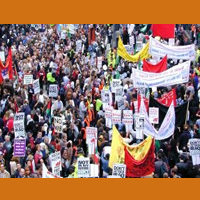MONETARY REFORM: THE MOVEMENT
Organizations involved in monetary reform
The past decades have seen the start of a movement of organizations aiming for monetary reform in their respective countries. All seek the transition to a public monetary system, thereby returning the right of seigniorage (the right to reap the benefits of money creation) to the State and thus, the general public. The foremost of these organizations are Positive Money in Great Britain, http://positivemoney.org/, and the American Monetary Institute, AMI, http://www.monetary.org/. Positive Money hosts the International Movement for Monetary Reform, with links to 24 sister organizations mostly in European countries, such as Monetative in Germany (https://www.monetative.de/, Monnaie Honnete in France (http://monnaiehonnete.net/), Dinero Positivo in Spain (https://dineropositivo.es/), and Ons Geld (Our Money) in The Netherlands (https://onsgeld.nu/).
For more information on organizations and websites aimed at monetary reform click here.
Citizen’s Initiative on Monetary Reform – The Netherlands
In 2015 the Dutch monetary reform movement Ons Geld managed to get over 100,000 signatures for a “Citizen’s Initiative” on monetary reform. A Citizen’s Initiative is a tool for putting a debate on the agenda of the main legislative body of The Netherlands, the Second Chamber of Parliament. To achieve this requires collecting a minimum of 40,000 signatures. The debate, held in April 2016, resulted in the decision to have the Scientific Council for Government Policy (Dutch acronym WRR) make a detailed analysis of the present monetary system and possible alternatives. By mid-2017 this study was still ongoing.
Memo’s related to the Citizen’s Initiative
The paper (in Dutch) sent by foundation Ons Geld to the Second Chamber as its input for the debate can be downloaded from https://onsgeld.nu/kamerdebat-memo-geldstelsel.pdf or here.
A second memo (also in Dutch) was sent to the WRR and a selection of members of Parliament by the originator of this website and author of its publications. This second memo touches upon a series of issues that did not get sufficient attention in the first memo. It can be downloaded (in Dutch) here. An abbreviated English translation is planned, and can hopefully be made available on this website in the course of 2017.
Comments on Citizen’s Initiative Our Money: Parliamentarians, press and economists
It is relevant to take a look at how the proposals of the Citizen’s Initiative Our Money have been received by the economic establishment: economists, the press, and politicians – especially the financial specialists of the larger political parties. The comments and the attitudes they reflect provide a good picture of the kind of opposition that may be expected when, as with the Citizens’ Initiative, changes to existing systems are proposed that go against the grain of economic dogma, paradigms, and ideology, or in other words, that are contrary to the economic faith.
In particular the comments that appeared in the Dutch “quality” newpapers Financieel Dagblad and Volkskrant and from the financial specialists of the major parties of the Second Chamber of Parliament are telling. Most of these comments are based on a misrepresentation of the proposals of Our Money – which apparently, were not even read. None reflect a proper consideration of the pros and cons of the current system and of the proposed alternative; instead a real discussion is avoided with platitudes. For an overview see the download Vooringenomenheid t.av. Systeemverandering – Kamer,Pers en Economen (translated: Bias: Experts on System Change – Chamber, Press and Economists), for the present only available in Dutch), This paper was added as an Annex to the second memorandum sent to the Scientific Council for Government Policy (WRR) and members of the Second Chamber. This annex / download also discusses the opinions of two Dutch (financial) economics professors, Prof. Wim Boonstra and Prof. Hans Visser.
Fortunately there were also parliamentarians who took the Our Money proposals more seriously, as is indicated by the fact that a motion to have those proposals be analyzed by the Scientific Council for Government Policy, the WRR, was passed by a sizeable majority; only the conservative-liberal party, the VVD voted against. On the other hand, Prof. Visser, in the economics journal ESB, gave an analysis which shows that, in contrast to most of the opponents of the initiative, he did go into depth in analyzing the proposals of Our Money as well as those of other organizations promoting monetary reform, notably Positive Money.
There was no sign of a thorough analysis and balanced assessment in the “quality” newpapers the Volkskrant and especially the Financieel Dagblad (Financial Daily). No opportunity was given for a serious discussion: although opponents of the Citizens Initiative were given ample space on the op-ed pages to react to the Citizens’ Initiative and the proposals of Our Money, the op-ed articles sent in response by Our Money were refused.
The above does not necessarily mean that those who defend the existing order do so to protect vested interests. On the contrary, many of these opponents are probably convinced that in their defence of the existing order and their fierce resistance to initiatives proposing change they provide a great service to society. That’s what makes change so difficult to achieve.
A summary of the comments on the Citizens Initiative “Our Money” can be found here.



